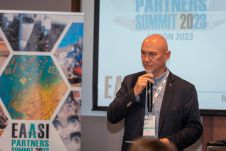Subversive Cartography
The ICA General Assembly has approved the establishment of a new Commission on Maps and Society. The aim is to facilitate and encourage the use of social-scientific and critical approaches to mapping, and to encourage more active engagement between cartographers and other social groups engaged in mapping activities. It thus has a twofold remit, to examine the nature of mapping activity from a theoretical-critical point of view, and to assess the state of such mapping activities as undertaken by non-traditional and non-expert groups.
Shift
The next formal meeting of the commission will take place at the annual conference of the Association of American Geographers in Boston, USA, in mid-April, where the topic “Subversive Cartographies” will be examined. These offer representations alternatives to established social and political norms. Maps are no longer cast as mirrors of reality; instead they are increasingly conceived as diverse ways of thinking, perceiving and representing space and place, expressing values, worldviews and emotions. Maps are no longer part of an elite discourse; they can empower, mystify, and enchant. This shift has been strongly facilitated by the increasing popularity of new media, burgeoning technological change, and newly developing mapping spaces (e.g. OpenStreetMap, WorldMapper and EmotionMap). Such mapping can be enacted outside existing cartographic conventions: it has escaped from the grasp of cartographers and nowadays everybody is mapping.
Situation
The first session will examine the role of the aesthetic in the construction of alternative and artistic mapping. Common themes are the relations between artistic practice and mapping, narrative and (e)motional cartography, and the politics of design. Papers will address intentionally manipulative cartography, the design and presentation of activist maps for raising awareness of social justice issues, and the nature of mapping by explorers and the influence of indigenous mapping of place on explorers. A fourth paper will examine the two-centre development in the 1950s (Paris and Boston) of “psychogeography” emanating from two very different disciplines, “situationism” and urban planning.
Technology
The second session will focus on the role of technologies and methodologies important in community engagement. Common themes include changing roles of the web, the emancipating potential of GIS and ways of evaluating the aesthetic. Also considered will be the perceived need to critically subvert traditional mapping of world history, the role of the web as a publishing medium for independent groups, mapping by physically disabled youngsters, the role of GPS in capturing a sense of place and the nature of grassroots GIS initiatives.
Subversion
The final, more abstract, session will examine aspects of subversion. Common themes cover the ambiguities of the subversive, different ways of theorising the medium, and the practical, political and affective potential of “oppositional” mapping. First considerations will be the nature of maps, alluring and evocative, yet distant, antisocial, detached, even alien, and pose the question, “are maps autistic?” Further presentations will examine the development of map “hoaxes” on the internet, the use of counter-mapping to engage with a campus space, and the way in which we can use emotion to affect geo-visualisations.

Value staying current with geomatics?
Stay on the map with our expertly curated newsletters.
We provide educational insights, industry updates, and inspiring stories to help you learn, grow, and reach your full potential in your field. Don't miss out - subscribe today and ensure you're always informed, educated, and inspired.
Choose your newsletter(s)
























